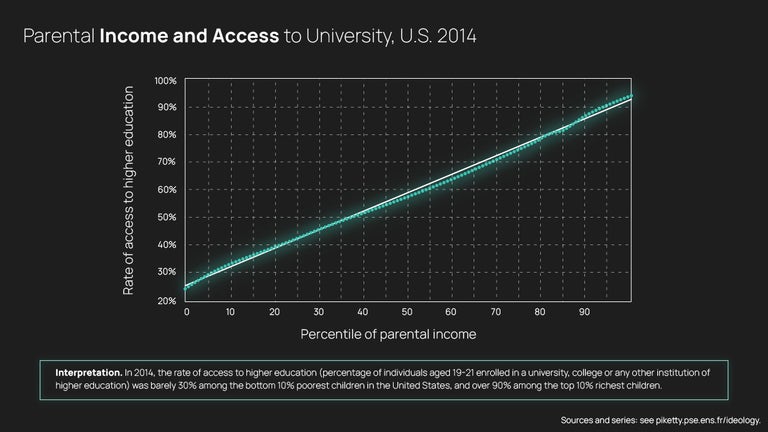Contents
- Great Beginnings
- Broken Promises
- The Cure
Higher education has been a very important element of the twentieth century. But is parent's income proportionate to a great education and where does that leave those that can't afford a college education?
Great Beginnings
Amid all the wars hot and cold, the formative story of the Twentieth century was that of more widespread, and higher quality, education.
- Globally, the century saw 3x increase in literacy, 3x more years of schooling.
- The US, an early leader in education, saw 2x higher high school graduation rates and 4x higher college graduation rates since 1960.
All this learning did initially increase productivity 4x (Figure 11.3) and per-capita GDP nearly 10x.
Broken Promises
Yet, the modern four year college system today is clubby, corrupt and completely anti-meritocratic. The clubbiness can be seen viscerally in college admission scandals, or more coldly in this chart.

This system is fair and honest only if you believe that the skills of any individual are directly proportional to their parents’ income. We do not.
Unsurprisingly, the system is facing a revolt and various attempted cures -- education regulation, employment protectionism, minimum wage increases and student debt cancellation.
The Cure
We believe the real reason education has become overvalued and underproductive is that the job market treats degrees (and their closely related, and even more undeserving cousin -- “years of experience”) as the currency of skill, and consequently takes them through boom-bust cycles. In reality, the college degree mainly measures a person’s ability to stay in college. Only a few of the skills acquired in a four year college program are necessary to work effectively.
At Crossover, our mission is to create a new currency built on verifiable proof of actually productive skills. By issuing badges of productive skill only to qualified workers, we will enable lifelong learners anywhere in the world to affordably and constantly trade their skills in a highly rewarding global marketplace.







